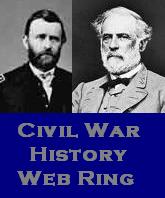Note: It seemed appropriate to post an entry for an Irish cavalry trooper on St Patrick’s Day, and we’ve been at work on Frank for quite a while now. I am deeply indebted to Patty Millich and Michael Higgins for the information contained in this entry. Patty appears to have been infected by the cavalry bug, and continues to turn up interesting cavalry tidbits. Michael’s done a great job of piecing together the family history on both sides of the Atlantic, and I encourage you to visit his website which is contained in the source list.
Francis McAtamney was born in the townland of Tirhugh, County Derry, Ireland in 1836. He was the oldest son and second oldest child of Hugh and Mary McAtamney. The family emigrated from Ireland in 1848, arriving in Philadelphia aboard the Arab on May 11th. The family settled in Washington township, Cambria County, Pennsylvania. Francis’ father was naturalized in 1853, and his mother died in January 1854.
At the outbreak of the Civil War, three of the four McAtamney sons enlisted in the Union Army. Francis enlisted as a private in Company F, 28th Pennsylvania Infantry on July 1, 1861 at Elizabeth, Pennsylvania. Bernard enlisted in Company A, 55th Pennsylvania Infantry (“Washington Rifles”) on August 28th, and Hugh enlisted in the same company on September 17th. It doesn’t appear as if any of the three returned after the war. The youngest brother, John, was too young to enlist at age nine.
The 28th PA was somewhat unique in that the regimental commander, Colonel Geary, had arranged for a battery of artillery to be raised with and attached to the infantry regiment. Francis served in Company F until October 3rd, when he was transferred at the order of the regimental commander to this artillery battery, commanded by Captain Joseph M. Knapp. He was one of several 28th PA soldiers transferred to bring the battery up to full strength.
Francis served with the battery for a year before again changing units. On October 27, 1862, he enlisted in Company K, 6th US Cavalry at Knoxville, Maryland. He was sworn into the regiment by the adjutant, Second Lieutenant Albert Coats, for the remainder of his original enlistment instead of a normal 3 year term. He apparently didn’t inform the battery of his intentions, as he was listed on their muster rolls as absent without leave for the remainder of the year. The War Department later amended the battery’s records with a note stating “the charge of desertion against this man is erroneous and is removed. He was enlisted in Co. ‘K’ 6th U.S. Cavalry October 27, 1862.”
I found the examining surgeon’s comments on the enlistment form interesting: “I certify, on honor, that I have minutely inspected the recruit, Francis McTamney previously to his enlistment, and that he was entirely sober when enlisted; that, to the best of my judgment and belief, he is of lawful age; and that, in accepting him as duly qualified to perform the duties of an able-bodied soldier, I have strictly observed the Regulations which govern the recruiting service. This soldier was blue eyes, brown hair, light complexion, is 5 feet 6 inches high.”
A few days before Francis’ enlistment in the 6th cavalry, his brother Hugh was killed in fighting at Pocotaligo, South Carolina on October 22, 1862.
Private McAtamney served with his new regiment throughout the campaigns of 1863. He was with his company on detached service at Cavalry Corps Headquarters in July, and missed the regiment’s mortal encounter at Fairfield, Pennsylvania.
Frank McAtamney apparently decided that he’d had enough as the spring campaign of 1864 was getting underway. He and another soldier who had joined Company K from Knapp’s Battery, Private John M’Cully, deserted at Fredericksburg, Virginia on May 13, 1864. Five days later, his other brother, Corporal Bernard McAtamney, was wounded and captured during fighting at Drewry’s Bluff. He died in prison in Richmond twelve days later.
Frank McAtamney never returned to the regiment. He surfaced briefly at the U.S. Army General Hospital in Annapolis, Maryland in December 1864. He reported that he was a member of the 6th US Cavalry, and the hospital wouldn’t have been able to refute this. He was treated for scurvy from December 19-23, then placed on furlough for the holidays. He didn’t return, and was again reported as a deserter February 7, 1865. At that point he is lost in the mists of history.
Note: in various records, the surname is spelled McAtamney, McTammany, McTamany, McTamney, often by Frank himself!
Sources:
Higgins, Michael. McAtamney family history information website: http://www.69thpa.co.uk/page29.html
McAtamney, Francis. Enlistment papers, Knapp’s Battery, NARA (copies courtesy of Patty Millich)
McAtamney, Francis. Enlistment papers, Company K, 6th U.S. Cavalry, NARA (copies courtesy of Patty Millich)
Muster Rolls, 6th U.S. Cavalry, M744, NARA
Monday, March 17, 2008
Subscribe to:
Post Comments (Atom)


No comments:
Post a Comment